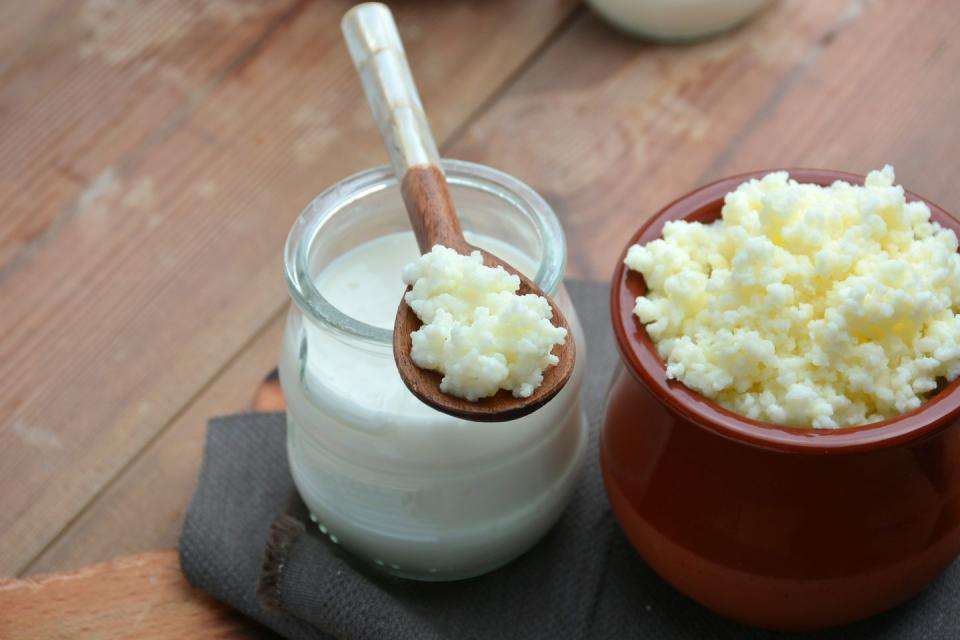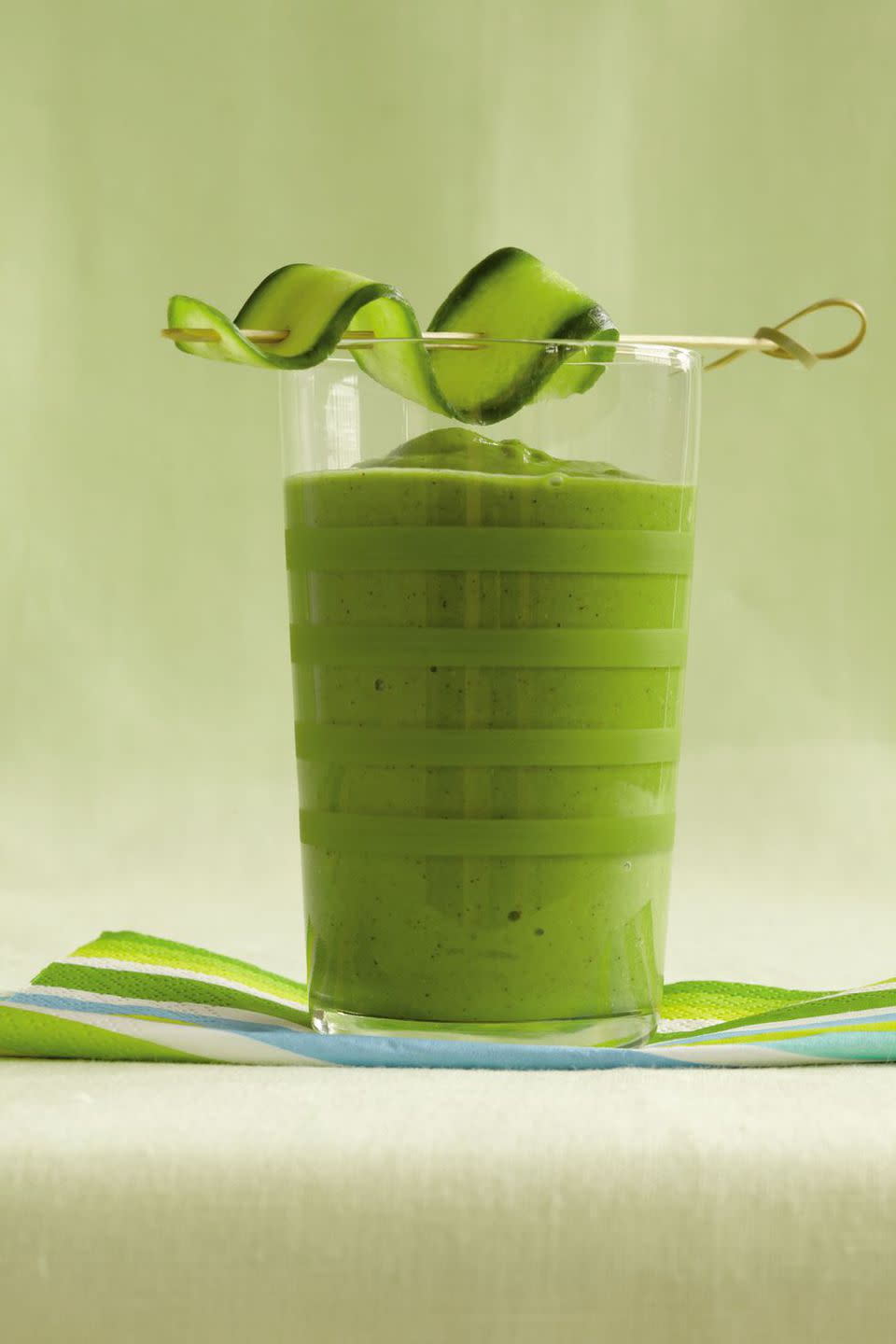This Gut-Healthy Drink Has More Protein Than an Egg
Yogurt has long been a staple of the average American diet-but its fermented cousin, kefir, has only recently started gaining popularity on this side of the Atlantic.
Now that it’s popping up in mass grocery stores like Whole Foods, there’s no denying that the tart drink is starting to go mainstream. You can thank the buzz behind probiotics for that. Like many other fermented foods, including kimchi and kombucha, kefir is a powerhouse of “good” bacteria for your gut. Here’s a closer look at the major health benefits the creamy beverage has to offer.
[Build a killer midsection in the kitchen for powerful, effortless miles on the road with Eat for Abs!]
Back up: What is kefir, exactly?

Traditionally, kefir was made from cow’s milk and kefir grain, which contains a combo of live bacteria and yeast to spur fermentation. The process has been around for centuries, according to a 2016 review published in the journal Frontiers in Microbiology. The result? A rich, smooth consistency with a tangy taste (think of it as a drinkable yogurt).
Now, mass-manufacturers tend to use a starter microbe culture instead of the kefir grain. And in addition to kefir made from cow’s milk, you can now find kefir made from goat’s, sheep’s, almond, coconut, or soy milks.
KEFIR NUTRITION FACTS: 104 calories, 9 g protein, 2.5 g fat, 11.5 g carbs (0 g fiber), 11 g sugar in 1 cup (lowfat and plain)
The health benefits of kefir
Kefir is great for your digestion
Kefir gets its superstar status from its probiotics, which can be worth adding to your diet if you struggle with bloating or irregular bowel movements, says Dawn Jackson-Blatner, R.D.N., a Chicago-based dietitian and the author of The Superfood Swap. It’s thought that probiotics boost your digestive health and bolster your immunity by colonizing your gut with beneficial microorganisms that help drive off other harmful bacteria, according to the National Institutes of Health.
“I tell people that are eating yogurt for probiotics to make the switch to kefir,” she says. “Kefir has more types of actual bacteria and a higher amount of good bacteria than yogurt.”
In fact, most traditional yogurts only contain a few strains of probiotics, she says-kefir, however, contains up to 12 strains. In all likelihood, the more strains of probiotics you eat, the better, says Jackson-Blatner. Although researchers haven’t pinpointed which bugs you need, or how many you should try to consume each day, some commonly studied strains include Lactobacillus and Bifidobacterium, which you can find in some supermarket varieties.
Kefir is rich in calcium
There’s no understating the importance of calcium, a mineral that’s crucial to the formation of strong bones. Both men and women aged 19 to 50 should aim to get 1,000 milligrams (mg) per day, but a 2014 report from the United States Department of Agriculture (USDA) found that 42 percent of Americans don’t eat enough of it. The typical kefir contains between 300 and 400 mg of calcium per cup-making the drink an “excellent” source of calcium, says Jackson-Blatner.
Kefir contains more protein than an egg
We need protein to build bones, muscle tissue, and new skin cells. Plus, this key macronutrient can also keep you fuller for longer, which can aid in weight loss.
Kefir contains about nine grams of protein per serving, which is more than what you’d find in traditional yogurts, but less than the amount found in Greek varieties, says Jackson-Blatner. Still, nine grams of protein is a pretty impressive dose, especially when you consider that a large egg contains about six grams.
Kefir is loaded with potassium
Despite the numerous health benefits of potassium-like lowering your blood pressure and possibly easing muscle cramps-many women are falling well short of the recommended 4,700 mg per day. According to a 2017 report from the USDA, women aged 20 to 69 only consume anywhere from about 2,200 mg to 2,400 mg of potassium.
One reason: The nutrient is largely found in fruits, vegetables, and dairy foods, says Jackson-Blatner-and about 90 percent of us don’t eat enough produce. A serving of kefir contains about 400 mg of potassium, so drink up if you’re sick of bananas.
You can drink kefir even if you have lactose intolerance
About 65 percent of people have trouble digesting lactose, a sugar that’s found in milk and other dairy foods. But even if you’ve shelved the milk carton years ago, there’s a good chance that you can still stomach kefir. “Although kefir contains some lactose, there are bacteria in there eating that sugar, so kefir has a lower lactose [than other milk-based products],” says Jackson-Blatner.
That’s not the case for people with milk allergies, however-in that case, it’s better to opt for a kefir made from a plant-based milk.
How to add kefir to your diet
Kefir makes an excellent base for a smoothie or smoothie bowl; you can also use it in place of regular milk in a bowl of cereal.

Just be sure to buy the plain varieties-not the flavored kinds. Yes, plain kefir can be a little sour-tasting, but as with yogurts, fruity-flavored options can have a lot of added sugar, says Jackson-Blatner. (And remember: Vanilla is a flavor, too.)
“I like people to use the 2 percent kind,” she says, since it helps neutralize the tartness of the kefir. “Just like cream in coffee takes the bitterness away, a little bit of fat makes dairy less sour and easier for people to eat,” she says. Plus, if you actually enjoy the tartness of kefir, you can drink it straight, or just pair it with a few berries for a satisfying snack.
('You Might Also Like',)

